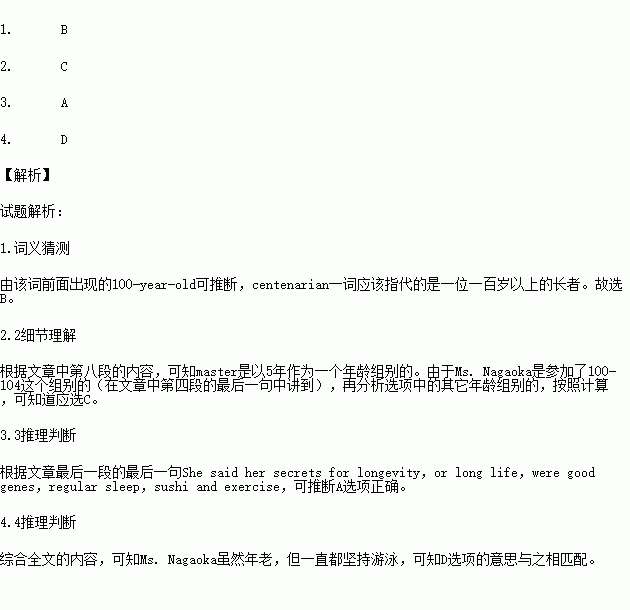题目内容
Nearing the age of 101 has not slowed down one Japanese woman.In fact,in the swimming pool—she is only getting faster.
Recently,a 100-year-old Japanese woman became the world’s first centenarian to complete a 1,500-meter freestyle swimming competition in a 25-meter poo1.
Her name is Mieko Nagaoka.Ms.Nagaoka set a world record for her age group at a recent Japan Masters Swimming Association event in the western city of Matsuyama.She swam the race in 1hour,15 minutes and 54 seconds.
By comparison,the overall female world record holder completed the same distance in just under 15 and a half minutes.But that swimmer,Katie Ledecky,is only 17 years old.And Ms.Nagao.ka was not competing against her.In fact,Ms.Nagaoka was the only competitor in the 100-104 year old category.Her race was not a race of speed but of endurance,or not giving up.
Breaking swimming records is nothing new to Ms.Nagaoka.So far she has broken 25 records.But she began competing when she was much younger—at 88.
Ms.Nagaoka sufferred a knee injury in her 80s,so she began swimming to help her body recover.Since her first international swimming competition,she hasn’t looked back,except maybe to see if her competition is catching up.
In 2002.at a masters swim meet in New Zealand,Ms.Nagaoka took the bronze medal in the 50-meter backstroke.In 2004,she won three silver medals at an Italian swim meet.
Masters swimming is a special class of competitive swimming to promote health and friendship among participants.Swimmers compete within age groups of five years.
Japan has a large number of people who live beyond 100 years old.Until she passed away this month,the oldest person in the world was also from Japan.Misao Okawa was born in 1 898.She said her secrets for longevity,or long life,were good genes,regular sleep,sushi and exercise.
1.The underlined word“centenarian”refers to someone who is____.
A.from Japan
B.100 or older
C.an old competitor
D.a new swimmer
2.Which is possibly the age category of the masters swimming competition?
A.82 to 87 years old.
B.93 to 97 years old.
C.95 to 99 years old.
D.106 to 110 years old.
3.It can be inferred from the passage that_____.
A.some people are born with longevity genes
B.people who like swimming live longer
C.the Japanese are interested in swimming
D.woman usually live much longer than men
4.Which can best explain the spirit of Ms.Nagaoka?
A.Not to advance is to go back.
B.After a storm comes a calm.
C.The early bird catches the worm.
D.Keep on going,never give up.
 亮点激活精编提优100分大试卷系列答案
亮点激活精编提优100分大试卷系列答案
